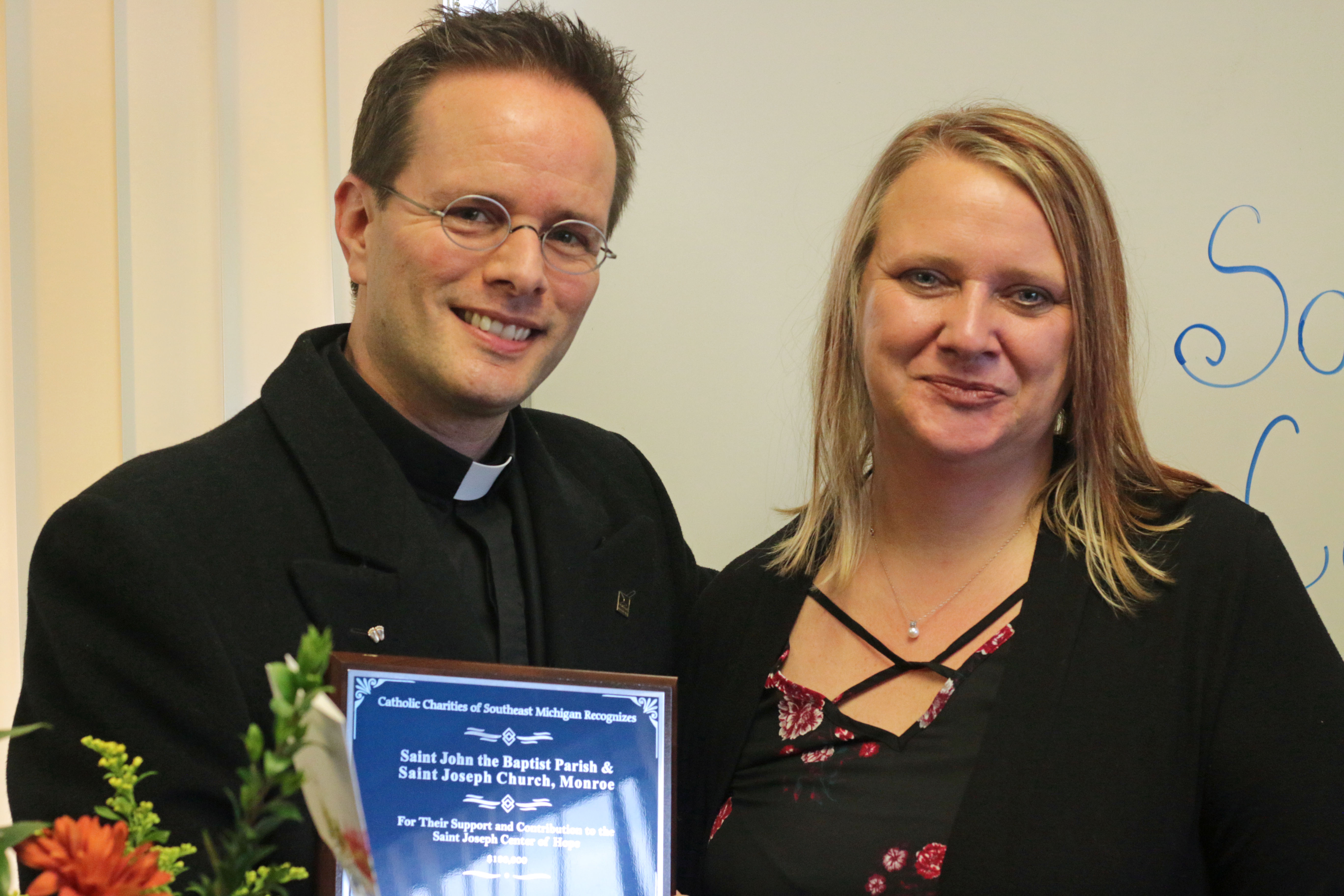St. Joseph Center for Hope will offer immediate respite for those struggling with substance abuse
MONROE — Mercy happens when the door to salvation is open.
In Monroe, at a new treatment center for those struggling with addiction and withdrawal, the door to salvation is literally open 24/7.
On Nov. 20, Detroit Archbishop Allen H. Vigneron joined local dignitaries and leadership from Catholic Charities in Southeast Michigan (CCSEM) for a ribbon-cutting ceremony of the new St. Joseph Center for Hope, a 24/7 crisis intervention center to serve people in active addiction and get them started on the road to recovery.
The facility, located at 222 Colonial Drive in Monroe, is the result of a partnership between CCSEM and ProMedica, a Toledo-based health care organization, which offered a building on its Monroe Regional Hospital campus to house the St. Joseph Center for Hope.
Wendy Klinski, assistant director of behavioral health at CCSEM, said the center will serve those of all faiths.
“People will be able to come here and get services and get into treatment,” Klinski said.
The new center offers meals, a shower and a bed and for those struggling with addiction or relapse, allowing them to receive immediate supervised care during their darkest moments.
“The center is a place that provides stabilization in a safe, welcoming environment,” said Martha Roberts, program manager of the St. Joseph Center for Hope. “Patients come in and take a shower and a nap; we feed them and get them on a recovery plan with a transition into a formal treatment plan. It’s not a permanent shelter, but a transition state on the road to recovery.”
Before the St. Joseph Center for Hope opened, Roberts said there wasn’t a place in Monroe County for patients to go for immediate help when it comes to dealing with addiction. The center is based on similar programs in Washtenaw, Lenawee and Livingston counties.
“Our main goal is to reduce opioid usage. Our death rate [in Monroe County] is almost exact to Washtenaw County, and Washtenaw County has almost three times our population,” Roberts said. “Having a center like this in this community is important because we are actually behind other communities when it comes to having a place where families can drop off someone who is in crisis.”

The new facility doesn’t take money or ask for insurance in order for a patient to check in, Roberts said; rather, the focus is on the patient becoming stable.
“When they come in here, we do all we can to help them out, judgment free,” Roberts said. “When they are using, they can go through withdrawal. We perform medical monitoring, check their vitals and make sure they are in a safe state before transitioning them to the next stage, whether that is an inpatient detox center or counseling. It really depends on the situation.”
The center’s name is inspired by the former St. Joseph Parish in Monroe, which closed in 2014, when the parish records were moved to St. John the Baptist Parish. St. John the Baptist donated to the establishment of the St. Joseph Center for Hope, using some of the funds from St. Joseph Parish. St. Joseph is also the patron saint of Catholic Charities of Southeast Michigan.
“This is a great work of mercy and one that is so pressing today,” Archbishop Vigneron said during the opening. “We know what a terrible scourge opioid addiction is in our communities, and I give God praise and thanks that by His strength, from so many different avenues, we have come together to establish this facility.
“I’m very appreciative of the parish life here in Monroe,” Archbishop Vigneron continued. “I think this can be a time of prayer for all of us, and I invite you to offer your own prayer as well, for all of those God will bring here, that they will have a new start and move forward in a life that is productive and flourishes.”
Local government officials and representatives from ProMedica were on hand to offer words of encouragement to the St. Joseph Center staff, commending the organizations involved.
U.S. Rep. Tim Walberg, R-Tipton, congressional representative for Michigan's 7th district — which covers Monroe County — touted a bill he co-sponsored with Rep. Debbie Dingell, D- Dearborn, which was signed by President Donald Trump in October.
The bill, H.R. 6, the SUPPORT for Patients and Communities Act, calls for doctors to have access to a consenting patient’s prior history of addiction before prescribing opioid painkillers and encourages safe disposal of unused medication by equipping hospice professional with the legal authority to safely dispose of unused drugs.
“Being a former pastor, I’m reminded of what Jesus said, ‘The thief comes to rob, steal and kill, but I come that you might have life abundantly,’” Rep. Walberg said. “That is what this center is about. People’s lives are being robbed, stolen from them ... This center is an opportunity to have renewal, to have their lives back.”









